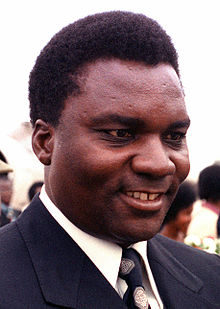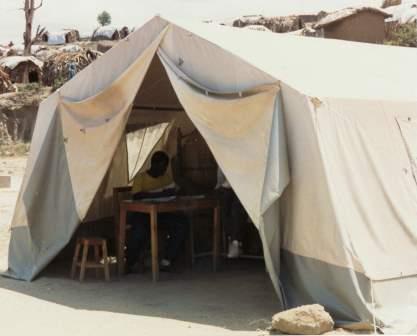The Rwandan audiotapes of the International Monitor Institute (IMI) records are comprised almost entirely of the transcripts of radio broadcasts translated from Kinyarwanda into French and English. These are the broadcasts which aired in 1994 during the Rwandan genocide, which took place from April through early July of that year and in which 800,000 Tutsis and moderate Hutus were massacred. The genocide was triggered by the assassination of Hutu President Habyarimana on April 6, 1994. An IMI piece on radio as a tool of genocide (available in the organizational records) summarizes these events: “His plane was shot down on his return from Arusha, Tanzania, where he met with RPF leaders and signed an agreement further limiting his regime’s hold on power (known as the August 1993 Arusha Accords).”

During colonization from the late 19th to the mid-20th century, the German and Belgian colonial elite manufactured a native elite in the Tutsis, a process of colonization that Franz Fanon describes in The Wretched of the Earth. Hutus thus experienced discrimination in education and various sectors of the economy. In 1959, Hutus took control of Rwanda following the independence movement, forcing many Tutsis to seek refuge in neighboring countries. In 1990, the Rwandan Patriotic Front (RPF) comprised of exiled Tutsis, invaded Rwanda, initiating a civil war. Habyarimana’s assassination resulted in an escalation of Hutu anxiety that the Tutsis would seize power of the government and that discrimination against Hutus would be reestablished.
Radio became a powerful weapon used to incite and direct the Rwandan genocide. The majority of radio broadcasts in the Rwandan audiotapes collection are from the privately-owned Radio Télévision Libre des Milles Collines (RTLM). What I found especially interesting about the content of these broadcasts (the transcripts of which can be found in the IMI organizational records and the audiotapes of which can be found in the Rwandan Videotapes and Audiotapes inventory) was the way in which its efforts to direct the extermination of the Tutsi population was paralleled by its efforts to claim authority over the telling of history. The radio broadcasts reveal a struggle over who gets to tell history and, therefore, a struggle over a monopoly on truth. In other words, the RTLM broadcasts exhibit a phenomenon which seems to be more universally true, which is the political necessity of storytelling.
There are a few particularly conspicuous aspects of the history-telling of the RTLM broadcasts, one being the discourse of revelation or enlightenment – the idea that if we only peel back the layers, we can finally see the truth. And this encounter with the truth is the basis for political action, or, in this case, the basis on which genocide becomes justified. “Slavery,” for example, is a term that is repeated throughout these broadcasts. Several journalists recall the state of Hutu slavery during colonization in order to characterize the discrimination Hutus experienced. Drawing on such a vocabulary, the radio broadcasts attempt to illuminate the Rwandan genocide as a slave rebellion. Freedom from slavery, according to this narrative, lies in the ability to discover the true history and nature of that discrimination, in opposition to the stories of the colonizers and the native elite. For the same reason, I’m less interested in the truth or accuracy of this, or any, construction of history than in the need and tendency to construct history more generally.
In one broadcast which aired on April 12, 1994 (6 days after Habyarimana’s assassination),[ii] Georges Ruggiu gives his audience a history lesson. He evokes Tutsi discrimination against Hutus in the colonial educational system and the ways in which the Germans and Belgians perpetuated this discrimination. Ruggiu situates the RPF’s efforts to seize power in Rwanda and oppress Hutus within that context. “Now we are going to continue with history,” he begins one segment. He goes on to describe how Hutus, beginning with the first school for Tutsis in 1917, were denied education and how, as a result of this denial of access, the Hutu became slaves to the Tutsi “who, according to the colonial legend, were born to rule.” I suspect that Ruggiu does not understand Hutu slavery as merely metaphorical. The discourse of slavery in these broadcasts seems to represent Hutu slavery as naked reality; that is, these broadcasts understand historical Hutu slavery to be literal. Indeed, in the segment that follows, Ruggiu draws on historical documents that testify to the fact that historically “Tutsis killed Hutu kings and enslaved Hutu people.”
Listen to an excerpt of this broadcast here.
In a second broadcast from April 17, 1994 (11 days after the assassination), journalist Agenesta Mukarutama leads a roundtable discussion about how the RPF seeks to return Rwanda to its pre-revolutionary time in which the Tutsi commanded and the Hutu obeyed. “But,” the broadcast tells us, “Rwandans have learned their history and are ‘saying no’ to a repetition of history.” Genocide is perceived as the only way to break out of an historical cycle of discrimination and oppression. Murego argues that “what it [the RPF] did not understand is a lesson from history. In fact, the political skeleton before ‘59 is clear: Some people command and others obeyed, and the RPF inserted its objectives in that scope . . . Since the conditions have changed, there is now no way to impose oneself as it was before . . . what happened is that it is a genuine restoration of the former reality where some people commanded, you understand who, and others have learnt to say ‘no.’ That is where the president of the PL [le Parti libéral] has made an important statement: ‘those who are saying no today, they are saying no considering their history, the history of their country . . .’” (emphasis is mine).
By suggesting that “there is now no way,” that is, that it would be either impracticable or unbearable for Rwanda to return to a pre-revolutionary state governed by colonial structures, Murego essentially makes a philosophical statement about history – not just what the content of that history is, but more specifically, the temporality in which revolutionary history operates. The Rwandan genocide here is not just a “saying no” to Tutsi rule; it is a “saying no” to a particular conception of the temporality of history that stands in opposition to the revolutionary conception of history. Murego’s argument, here, seems to be that the RPF does not understand how historical time actually works. Ngirumpatse, a participant of the roundtable, follows this up:
“First thing, at the risk of disappointing many Rwandans, especially the educated people, I have always considered the Arusha Agreements as an exception in the people’s history. No any people make a revolution just once. France has made a Revolution, it had two or three restorations, it took 100 years for the Republic to impose itself. When I say Republic, I mean the power of people. . . . So I consider the Arusha Agreements as an exception in the people’s history.” Ngirumpatse makes this claim repeatedly: “I consider the Arusha agreements as an exception in history.”
Ngirumpatse refers to the Arusha Accords as exceptional insofar as they are exceptionally generous; this generosity, it seems, arises from the mistaken belief among Rwandans that their revolution was finished once and for all. But again, what is more interesting to me is the temporality of the historical discourse within the broadcasts themselves – the repetition of the insistence that history cannot and will not repeat itself.



